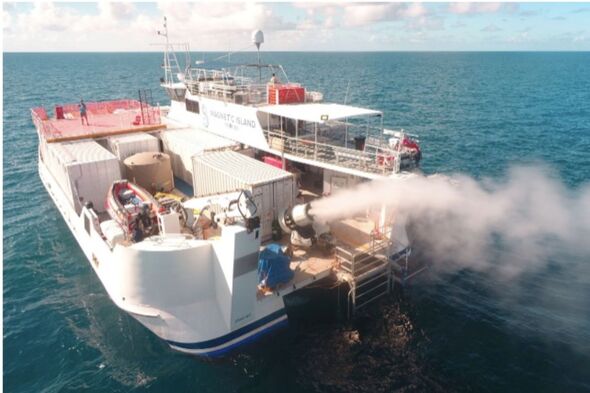URGENT UPDATE: A controversial geoengineering experiment aimed at altering weather above the San Francisco Bay was abruptly halted by city officials last year, new documents reveal. Funded by a group of billionaires, the project intended to deploy salt water-spraying machinery to create artificial clouds over an area larger than Puerto Rico.
The initiative, led by the University of Washington, was designed to test methods for reducing global warming through solar radiation management. However, the experiment was cut short after just 20 minutes when officials in Alameda confirmed they were not aware it was taking place, according to documents obtained by Politico.
This multi-million dollar effort, which could have cost between $10 million and $20 million, aimed to assess whether cloud-manufacturing technologies could produce meaningful changes detectable from space. The plan included expanding research efforts to regions across western North America, Chile, and south-central Africa.
A 2023 research plan from the university’s Marine Cloud Brightening Program (MCB) highlighted a growing urgency in the face of climate change, stating, “At such scales, meaningful changes in clouds will be readily detectable from space.” However, the experiment’s abrupt termination raises questions about the future of geoengineering research.
Despite the ambitious goals, concerns over transparency and potential weather manipulation have fueled intense debate. “The program does not ‘recommend, support, or develop plans for the use of marine cloud brightening to alter weather or climate,’” stated Sarah Doherty, who leads the MCB program. The Mirror has reached out for further clarification.
Critics have voiced strong opposition to solar geoengineering, warning it could disrupt ecosystems and agricultural yields. Notably, Rep. Marjorie Taylor Greene has linked geoengineering to recent deadly floods in central Texas, further complicating the public discourse surrounding the technology. In response, she introduced legislation to criminalize such practices.
Supporters argue that the pressing threat of climate change necessitates continued research into innovative solutions. Billionaire backers of the University of Washington initiative include Chris Larsen and Rachel Pritzker, who assert that comprehensive climate strategies must include geoengineering.
“Scientists are facing political attacks and drastic funding cuts. We need to complement a rapid energy transition with more research into a broad range of potential climate solutions,” Larsen stated.
The documents suggest that the project, which faced numerous operational challenges and funding uncertainties, may not proceed further without significant public backing. “There’s a difference between what they should have been required to do and what it would have been smart for them to do, from a transparent perspective, to gain the public’s trust,” commented Daniele Visioni, a professor of atmospheric sciences at Cornell University.
As the debate over solar geoengineering continues, the implications of this thwarted experiment could influence future research funding and regulatory decisions. What happens next remains uncertain, but ongoing discussions are expected to shape the landscape of climate intervention strategies.
Stay tuned for updates on this developing story as more information becomes available.






































































